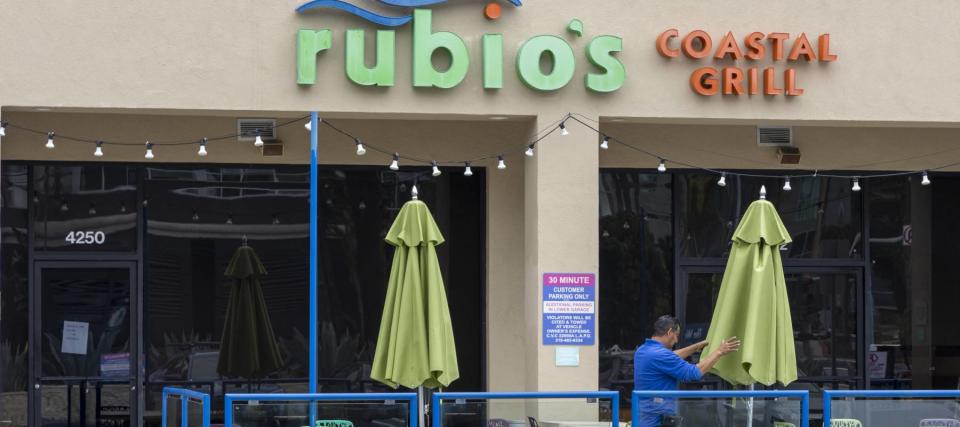Rubio's Coastal Grill closes 48 California locations, files for bankruptcy — cites high costs and minimum wage

Starting as a humble taco stand in San Diego in 1983, Rubio's Coastal Grill has since grown into a beloved restaurant chain known for its coastal-inspired cuisine, particularly its signature fish tacos.
However, following recent struggles to stay afloat, the company announced on June 5 that it's filing for Chapter 11 bankruptcy.
Don't miss
Commercial real estate has beaten the stock market for 25 years — but only the super rich could buy in. Here's how even ordinary investors can become the landlord of Walmart, Whole Foods or Kroger
Cost-of-living in America is still out of control — use these 3 'real assets' to protect your wealth today, no matter what the US Fed does or says
These 5 magic money moves will boost you up America's net worth ladder in 2024 — and you can complete each step within minutes. Here's how
The news came just a few days after Rubio's closed 48 “underperforming” locations in California. The company noted that the closings “were brought about by the rising cost of doing business in California."
Rubio’s remaining 86 restaurants in California, Arizona and Nevada will continue operating. The company plans to sell its business to an entity formed and controlled by its existing lender.
“Despite the company's best efforts to right-size the company, the continued challenging economic conditions have negatively impacted its ability to meet the demands of its debt burden,” Rubio’s chief restructuring officer Nicholas Rubin said as part of the announcement. “The company believes the best path forward for Rubio's is through a court-supervised sale process that will position the brand for long-term success to grow and flourish.”
Restaurant industry headwinds
Rubio’s is not the only restaurant that’s facing significant challenges. Red Lobster, the popular seafood restaurant chain that has been around since 1968, also announced it had filed for bankruptcy on May 19.
Red Lobster’s management highlighted several factors that have contributed to the company's financial difficulties, including inflationary pressures, unfavorable leases, underperforming locations and marketing and operational missteps.
In a social media post, Rubio’s assured its customers that it’s still in business and will be “for a long time.” The company explained that the bankruptcy filing was intended to “right-size the company to better thrive in today’s retail environment.”
Read more: Rich young Americans have lost confidence in the stock market — and are betting on these assets instead. Get in now for strong long-term tailwinds
The post also elaborated on the broader challenges facing the restaurant industry.
“Like the restaurant industry overall, Rubio’s has been negatively affected over the past few years by diminishing in-store traffic attributable to work-from-home practices remaining in place, and by rising food and utility costs that, combined with significant increases to the minimum wage in California, put pressure on a number of its locations,” the company stated.
At its peak, Rubio’s boasted about 200 restaurants with locations in Colorado and Florida, according to the Los Angeles Times. But the chain suffered during the pandemic, and rising costs led it to slim down to 134 locations, prior to this latest news.
West Coast woes
California has seen a consistent and significant increase in its minimum wage over the past decade. A decade ago, the state’s minimum wage was $9 an hour. Today, it’s set at $16 an hour, rising to $20 an hour for fast food workers.
These wage increases are aimed toward improving the quality of life for workers in a state that’s notoriously expensive to live in. But it can have an effect on business operations.
For example, Rubio’s is not the only restaurant to cite the minimum wage as a reason for its closure. A Fosters Freeze in Lemoore shut down on April 1 — the same day the new minimum wage for fast food workers went into effect — leaving its workers without jobs.
“Small businesses can't survive a 120% plus min wage increase over the last 10 years,” Loren Wright, owner of the Fosters Freeze location, told Fox 26 News.
Those that remain open are facing substantially higher financial pressures.
Alex Johnson, who owns five Auntie Anne’s and five Cinnabon locations in San Francisco, estimated in an interview with Fox Business that the recent minimum wage increase would cost him $470,000 across his locations.
What to read next
Car insurance premiums in America are through the roof — and only getting worse. But 5 minutes could have you paying as little as $29/month
‘You’ll end up with $1.5 million in the bank’: Kevin O’Leary says you should do this 1 thing with your money in order to 'succeed into retirement’
The 5 most expensive mistakes in options trading and how to avoid them
This article provides information only and should not be construed as advice. It is provided without warranty of any kind.

 Yahoo Finance
Yahoo Finance 